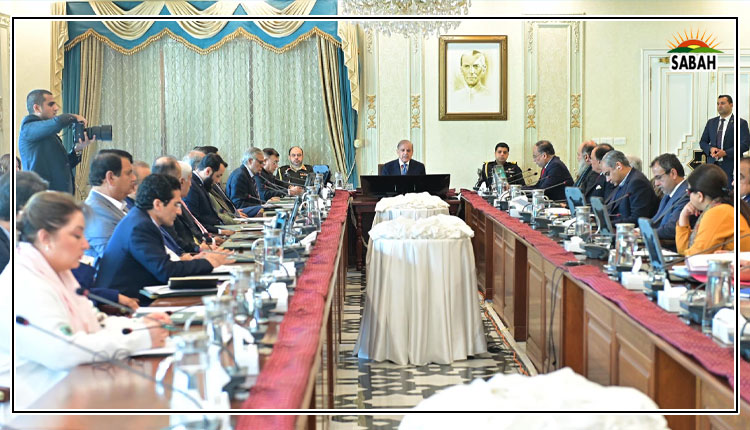How to right-size the government…Hassan Baig
The latest buzzword these days is rightsizing the government. This usually points to calls for reforms aiming to reduce government expenses and the budget deficit.
But rightsizing or reforms is a wider concept, covering the restructuring of the government and calling for reforms at all levels, including not only the federal and provincial governments but also the local governments, and stretching it to all three pillars of the state: executive, legislature and judiciary.
Privatization, public-private partnerships (PPPs), and in some specific cases nationalization are all part of the rightsizing of the government.
Pakistan has been setting up various committees to perform the functions of rightsizing, restructuring and reforms since 2000, but nothing substantially has been achieved so far. Prime Minister Shehbaz Sharif has now set up two committees to downsize the government to reduce its expenditure by transferring several functions to provincial governments.
These committees are directly working under the chairmanship of Deputy Prime Minister Ishaq Dar and Finance Minister Muhammad Aurangzeb. After the 18th Amendment, the federal government has already shifted a lot of its load to provincial governments. Some divisions within the federal government could be declared redundant too.
The ministries or divisions which could outrightly be abolished include states and frontier regions (Safron), health services, housing and works, Kashmir affairs, religious affairs, inter-provincial coordination division, education, climate change, economic affairs, etc by forming only wings of such ministries working directly under the cabinet division or a separate all-in-one division looked after by the PM office.
What provincial governments need to do is go all-out for reforms by restructuring their departments. They are to bear the brunt of rightsizing at the federal level. The provinces have become almost autonomous and independent to run their businesses after the 18th Amendment. They can raise their revenues through taxes; create their investment authority; get loans from international agencies by extending guarantees based on their assets and resources.
They are already getting a share of revenues from the federation through the National Finance Commission (NFC) Award. They need to take more responsibility by supporting the federal government in the repayment of loans and interest.
The provinces are under constitutional obligations to take care of their people through population planning and welfare departments. The federal government needs to take up this issue in the Council of Common Interest (CCI), and a policy decision should be taken by the provinces to control the huge population growth.
The second most important department to be strengthened by the provinces is climate change, as its importance has increased manifold in the context of the destructive nature of climate change. The provinces again should be directed through the CCI to strengthen their climate change departments to mitigate climatic effects on crops, people, etc. The overhaul of provincial departments on these two counts is needed, as they need to enhance their capacity and capability to cope with the situation.
When we talk about the restructuring of the federal government and reforms at all levels, we highlight oversized expenses on the part of some ministries, divisions or departments. In the case of Pakistan, debts, loans and interest payments disturb all our economic planning.
The country needs to decide how to retire its debts and get rid of huge outstanding loans. The economic affairs division and debt management cell in the Ministry of Finance apparently have devised no strategy to get rid of loans; in fact it keeps thinking about how to get more loans to repay the existing loans. No country in the world does what we do. Pakistan, being a nuclear state, does not need such a huge infrastructure for its defence. Reforms and rightsizing are also needed here to rationalize defence expenditure.
Rightsizing or strengthening the telecom sector is also needed. The federal and provincial governments need to strengthen IT infrastructure for fast communication; promoting e-commerce and enhancing IT exports and services are essential to help boost economic growth. That is one area of interest where Pakistan needs to increase its strength by investing more instead of decreasing expenditure, as it can contribute a lot to economic growth and can be a game-changer for Pakistan.
Privatization and public-private partnerships (PPP) are part of rightsizing as the responsibilities and roles of the federal government are redefined whether to run businesses or act only as the regulator. The government has already taken a policy decision to get rid of losses incurred by, and subsidies extended to, state-owned enterprises (SOEs). The privatization of SOEs is the right decision, as modern states do not run businesses but instead take care of their people through economic growth contributed by the private sector.
Nationalization is one of the options at a limited scale, which may also be included in the rightsizing exercise. One sector that needs rightsizing and reforms is the power sector. Power policies have given an opportunity to private investors to invest in this sector in the form of IPPs on favourable terms for these investors, resulting in huge losses and a rising circular debt that makes the lives of ordinary people miserable.
The industry has also suffered a lot due to the increased cost of production, making it uncompetitive in the global market; this adversely affects our exports. These IPPs may be nationalized immediately to get rid of circular debt, as almost 7080 per cent of shares are held by either the Pakistan government or Pakistani investors. This one decision may save our nation from the destruction caused by investment in this sector. This may be a bad decision in the context of the overall policy, but it is the only option to save the country from the burden of capacity charges.
Lastly, rightsizing, reforms and restructuring are critically needed to strengthen the weak or almost nonexistent local government system. Making it functional is the first step towards better governance. The unfortunate part is that our legislators at the federal and provincial levels do not want to make them functional and workable, as they are themselves involved in development schemes at the local level, earning a lot of influence and affluence through these schemes, which are supposed to be undertaken by local governments as per constitutional requirements.
Here lies dishonesty on the part of our legislative bodies, which needs to be corrected if we want the rightsizing of the government to deliver and contribute towards our development and economic growth. But who will bell the cat?
There are whispers that the federation will become weak through rightsizing as it may lose control over provinces. This argument is not as strong as it seems to be. Economic security today has become almost synonymous with the security of the state. If history is any guide, we saw that the weak federation of the US became a strong federation through economic prosperity and welfare of its states.
The size of the government does matter if economic growth and prosperity are achieved, but in the case of Pakistan, that is missing. So, rightsizing is needed to help afloat the sinking boat.
Courtesy The News












